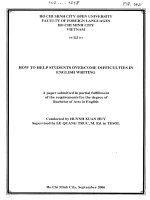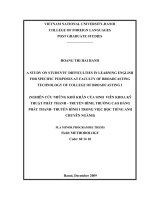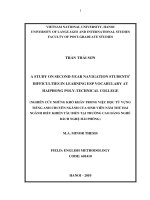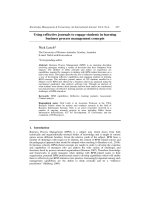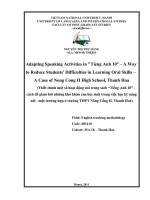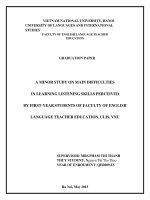4 WAYS TO OVERCOME DIFFICULTIES IN LEARNING
Bạn đang xem bản rút gọn của tài liệu. Xem và tải ngay bản đầy đủ của tài liệu tại đây (259.62 KB, 57 trang )
MINISTRY OF FINANCE
ACADEMY OF FINANCE
--------------------
STUDENT:
VŨ TUẤN CƯỜNG
GROUP: CQ55/51.01
GRADUATION THESIS
TOPIC:
WAYS TO OVERCOME DIFFICULTIES IN LEARNING
ENGLISH LISTENING SKILL IN ORDER TO
IMPROVE THE SUBJECT RESULT FOR FFL STUDENTS
STUDYING ENGLISH
Major
: English for Finance and accounting
Student code
: 17522202010005
Supervisor
: M.A Pham Thi Lan Phuong
Hanoi – 2021
MINISTRY OF FINANCE
ACADEMY OF FINANCE
--------------------
Student:
Group:
Vũ Tuấn Cường
CQ55/51.01
22
GRADUATION THESIS
TOPIC:
WAYS TO OVERCOME DIFFICULTIES IN LEARNING
ENGLISH LISTENING SKILL IN ORDER TO
IMPROVE THE SUBJECT RESULT FOR FFL STUDENTS
STUDYING ENGLISH
MINISTRY OF FINANCE
ACADEMY OF FINANCE
--------------------
STUDENT: VŨ TUẤN CƯỜNG
GROUP: CQ55/51.01
GRADUATION THESIS
TOPIC:
33
WAYS TO OVERCOME DIFFICULTIES IN LEARNING
ENGLISH LISTENING SKILL IN ORDER TO
IMPROVE THE SUBJECT RESULT FOR FFL STUDENTS
STUDYING ENGLISH
Major
: English for Finance and
accounting
Student code
: 17522202010005
Supervisor
: M.A Pham Thi Lan Phuong
Hanoi – 2021
44
55
DECLARATION
I hereby declare that this thesis is my own work and effort. It has not been
submitted anywhere for an award. Where other sources of information have been
used, they have been acknowledged.
Graduation thesis author
Vũ Tuấn Cường
66
77
ABSTRACT
Today, in the context of globalization and integration throughout the world, the
role of English is increasingly enhanced.
Recognizing the importance of
communication in life, the English Department at the Financial Academy has
officially introduced the English for Finance and Accounting for students with
Bachelor of English Language. However, students who study this subject face
certain problems related to listening skills. Recognizing the negative impact of these
students' academic results, the author conducted a study to identify some of the
common problems encountered during the listening to English process. The
objective of this thesis is to find out the ways to help students learning English
improve their results in this subject and the overall purpose of this study is to
identify the main challenges that new graduates face when listening. The thesis
includes three chapters. Chapter 1 gives the readers information about the Literature
Review of English listening. Chapter 2 is to identify these difficulties, the study was
conducted through the following steps: data collection, data analysis, and personal
assessment to find the relationship between theory and the difficulties these students
have encountered in practice. In chapter 3, the writer would like to give some
recommendations to help students who are and will study English to overcome
common problems encountered when performing listening activities, thereby
improving subject learning outcomes. Finally, this is only a scientific research
proposal, not specifically applied in practice, the writer only asks to give the steps
to carry out the study and at the same time predict the results of the research. Due to
the limited time, mistakes are inevitable during the process, the researcher wishes to
receive sympathy from the teachers and friends.
88
ACKNOWLEDGEMENTS
In fact, I cannot do a graduate thesis alone without the support and help of
others, whether directly or indirectly. This thesis will not be complete if I do not
receive the attention and support of my teachers, family, friends, and colleagues at
the internship during the time doing the graduation thesis.
First, I would like to express my most sincere thanks to Ms. Pham Thi Lan
Phuong - Head of the Foreign Language Department of the Academy of Finance,
the teacher who is in charge of guiding me to do the graduation thesis. The devotion
to her comments and suggestions on her essay provided me with a lot of useful
knowledge to apply in the construction of my research. For even the smallest
mistakes, she consistently helps me point out and correct them, so I have more
valuable experience to present my writing most completely and professionally.
Without these instructions, comments, this essay will not be complete.
I would also like to thank the teachers and students from the English
department at the Financial Academy, who have taught me subjects in the English
major during the past semester, and the teachers who teach the related general
subjects The knowledge and experience I have learned from the teachers during my
time at the school plays an important role in completing this graduation thesis.
I would also like to thank the dedicated help of FFL students in AOF
especially K57 for the support and teachers in charge of teaching English.
They are the ones who have actively helped me collect data, complete the
questionnaire and interview questions to build and complete the final thesis.
99
Finally, I would like to express my deep thanks to my family members and
close friends who have always been by my side and have been a great
encouragement to help me complete this essay.
1010
TABLE OF CONTENTS
1111
TABLE
1212
INTRODUCTION
1. Rationale of the study
Listening is the most often employed skill in everyday conversation (Morley,
1999; Scarcella & Oxford, 1992). According to Mendelsohn (1994), listening
accounts for 45 to 50 percent of overall contact time. As a result, it is undeniable
that listening is important for both communicating and learning a foreign language.
Listening, as opposed to hearing, is intentional and centered rather than
involuntary (chapter 4, Public Speaking: Practice and Ethics v. 1.0). As a
consequence, inspiration and effort are needed. At its best, listening is constructive,
intense, and concerted attention directed toward interpreting the meanings conveyed
by a speaker. Furthermore, listening ability is critical in language acquisition since it
produces language input. According to D. Renukadevi, listening is important
because it helps language learners learn grammar, word stress, vocabulary, and
syntax, and understanding of messages articulated can be dependent solely on tone
of voice, pitch, and accent; and this is only possible when we listen. Without
understanding input appropriately, learning simply cannot get any improvement. In
addition, without listening skill, no communication can be achieved.
Furthermore, both native and non-native English - speaking countries have
extensively used English as a main language in everyday life and at many
educational levels around the world. Listening awareness is becoming more critical
in learning a foreign language, as is information shown in seminars and on
television. It is especially important for the majority of English as a second
language students.
Despite the importance of listening skills in learning English, the state of
teaching and learning listening skills has long been neglected and given little
consideration. Furthermore, the Vietnamese school system emphasizes coaching
tests with a strong emphasis on grammar, reading, and vocabulary. While listening
is included in course books at many educational levels, it is often overlooked by
teachers during classes. As a result, many Vietnamese students, including those who
1313
do well on grammatical examinations, are unable to interact effectively with
foreigners in everyday situations.
Knowing the importance of this subject as well as the Listening ability, the
Department of Foreign Language of the Academy of Finance has incorporated
Financial English into their teaching program as a subject that consists of four key
skills (Reading, Speaking, Writing and Listening). Of instance, there are already
certain challenges that FFLers must overcome in order to achieve proper listening
skills.
As a result, recognizing their challenges in achieving their goals will assist
them in overcoming hurdles in the learning process and facilitating study courses.
This is why we conduct this research in the hope that it will be a valuable guide for
improving English skills, especially listening skills. Furthermore, this work offers
useful ideas and pedagogical implications for both teachers and students.
2. Aims of the study
This research is intended to draw out valuable sources for both educators and
learners to assess their teaching and learning listening experiences in the classroom,
as well as their use in everyday conversation.
3. Methods of the study
The study will be conducted using questionnaires for FFL students only and
interview questions for teachers.
4. Scope of the study
Due to the researcher's time and information constraints, this study primarily
focuses on FFL students who have little capacity to learn in class into their works in
the hopes of improving their success in learning English.
5. Organization of the study
This study consists of three chapters:
Chapter 1: Literature Review
Chapter 2: The Study
Chapter 3: Recommendations
Chapter 1: Literature Review
1414
1. 1. English Listening theory
1.1.1. Introduction of Learning English listening
1.1.2. Process of English Listening
1.1.3. Strategies for English Listening
1. 2. The importance of listening skills in learning
1. 3. Difficulties in learning English listening:
1.3.1. Difficulties from the speakers
1.3.2 Difficulties from the content
1.3.3 Difficulties from learners
1.3.4 Difficulties from physical setting
Chapter 2: The Study
2.1. Subject of the study
2.1.1. FFL students
2.1.2. The teachers
2.1.3. Teaching materials
2.2. Data collection instruments
2.2.1. Questionnaires
2.2.2. Interviews
2.2.3. Observations
2.3. Data collection procedures
2.4. The findings
2.4.1. From questionnaires
2.4.2. From interviews
2.4.3. From observations
2.4.4. Discussions
Chapter 3: Recommendations
3.1. Recommendations to students
3.2. Recommendations to teachers
CONCLUSIONS
APPENDIX
REFERENCES
CHAPTER 1: LITERATURE REVIEW
1.1. 1. 1. English Listening theory
1.1.1. 1.1.1. Introduction of English listening
1.1.1.1 Definition of Listening skill
Listening is the first and most basic skill in learning a new language that
beginners have to learn. It is a receptive skill meaning that the language learning
1515
beginners receive new words from what they have heard or listened to. The ability
to receive will affect the ability to produce. If they are good at listening; as a result,
they will understand and even have a good competency in productive skills namely
speaking and writing.
There are some definitions given by linguists and the following:
1.
According to Brown (H Douglas Brown, Language Assessment Principles
and Classroom Practice (NY: Pearson Education, 2004), 118.) listening is a spoken
or written response from the student that indicates correct (or incorrect) auditory
processing. To become better listeners, the learners must think actively when they
are listening. Listening is involved in many language-learning activities, both inside
and outside the language classroom. The improvement in listening will provide a
basis for the development of other language skills.
2.
Nation and Jonathan “Listening is the natural precursor to speaking; the
early stages of language development in a person’s first language (and in the
naturalistic acquisition of other languages) are dependent on listening (I. S. P.
Nation and J. Newton, Teaching ESL/EFL Listening and Speaking, Routledge: New
York, 2009, 37.)
3.
According to Lorena Manaj (The Importance of Four Skills Reading,
Speaking, Writing, Listening in a Lesson Hour, 31), listening is yet another
necessitate in language. The more efficient a listener you are the more successful
and satisfied you will be. Listening is not merely hearing: it is a state of receptivity
that permits an understanding of what is heard and grants the listener full
partnership in the communication process.
1.1.1.2. Definition of English Listening
Effective listening is the process of analyzing the sounds, organizing
them into recognizable patterns, interpreting the patterns and, understanding the
message by inferring the meaning.
1616
Listening is not to be confused with hearing. Hearing is a physiological
process that involves receiving the sound waves by the eardrum and transferring
them to the brain. Listening is more than hearing. It involves the process of
interpretation and inference.
Listening is an extremely important means of communication. Many of the
problems we experience with people are primarily attributable to ineffective
listening or lack of listening. Good listening skills are the foundation of effective
human relations.
There are some definitions given by linguists and the following:
a) Vishwanath Bite defines Listening skills as key to receiving messages
effectively. It is a combination of hearing what another person says and
psychological involvement with the person who is talking
b) According to Herbert J. Walberg Listening skills are essential for learning
since they enable students to acquire insights and information, and to achieve
success in communicating with others.8 Based on several definitions above, it can
be concluded that listening
Based on the two definitions above, it can be concluded that listening is one of
the abilities of every human being who can be seen directly, but not all people in the
world can listen to English except those who are indeed their native speaker or first
language in English or involved in many language-learning activities, both inside
and outside the language classroom and about listening skills are the ability to
actively understand the information provided by the speaker, and display interest in
the topic discussed. It can also include providing the speaker feedback, such as
asking pertinent questions; so the speaker knows the message is being understood
1717
1.1.2. 1.1.2 Process of English Listening
A. According to I.S.P. Nation and J. Newton some listening processes as
follow:
a)
Bottom-up Processes
These are the processes the listener uses to assemble the message piece-bypiece from the speech stream, going from the parts to the whole. Bottom-up
processing involves perceiving and parsing the speech stream at increasingly larger
levels beginning with auditory-phonetic, phonemic, syllabic, lexical, syntactic,
semantic, propositional, pragmatic, and interpretive (Field, 2003: 326).
b) Top-down Processes
Top-down processes involve the listener in going from the whole their prior
knowledge and their content and rhetorical schemata to the parts. In other words,
the listener uses what they know of the context of communication to predict what
the message will contain, and uses parts of the message to confirm, correct or add to
this. The key process here is inferencing.
B. According to Vishwanath Bite The process of listening occurs in five
stages. They are hearing, understanding, remembering, evaluating, and responding
as follow:
1) Step-1 Receiving (Hearing): Hearing it is referred to the response caused by
sound waves stimulating the sensory receptors of the ear; it is a physical response;
hearing is the perception of sound waves; you must hear to listen, but you need not
listen to hear (perception necessary for listening depends on attention). Brain
screens stimulia and permits only a select few to come into focus- this selective
perception is known as attention, an important requirement for effective listening.
2) Step-2 Understanding (Learning): Understanding this step helps to
understand the symbols we have seen and heard, we must analyze the meaning of
the stimuli we have perceived; symbolic stimuli are not only words but also sounds
like applause and sights like a blue uniform that has symbolic meanings as well; the
1818
meanings attached to these symbols are a function of our past associations and of
the context in which the symbols occur. For successful interpersonal
communication, the listener must understand the intended meaning and the context
assumed by the sender.
3) Step-3 Remembering (Recalling): Remembering is an important listening
process because it means that an individual has not only received and interpreted a
message but has also added it to the mind’s storage bank. Listening to our attention
is selective, so too is our memory- what is remembered may be quite different from
what was originally seen or heard.
4) Step-4 Evaluating (Judging): Evaluating only active listeners participate at
this stage in Listening. At this point the active listener weighs evidence, sorts fact
from opinion, and determines the presence or absence of bias or prejudice in a
message; the effective listener makes sure that he or she doesn’t begin this activity
too soon; beginning this stage of the process before a message is completed requires
that we no longer hear and attend to the incoming message as a result, the listening
process ceases.
5) Step-5 Responding (Answering): Responding to this stage requires that the
receiver complete the process through verbal and/or nonverbal feedback; because
the speaker has no other way to determine if a message has been received, this stage
becomes the only overt means by which the sender may determine the degree of
success in transmitting the message. From the explanation above about the types
and processes purpose of the listening is to have social relationships with people
around and we can do many things because the conversation has many functions
one of which we can mingle with everyone and The purpose of the listening
performance is not necessarily to look for global or general meanings but to be able
to comprehend designated information. Students can improve their listening skills
and gain valuable language input through a combination of extensive and intensive
listening material and procedures.
1919
2020
1.1.3. 1.1.3 Strategies for English Listening
a. Top-down strategies are listener based. The listener taps into background
knowledge of the topic, the situation or context, the type of text, and the language.
This background knowledge activates a set of expectations that help the listener to
interpret what is heard and anticipate what will come next.
Top-down strategies include
• Listening for the main idea
• Predicting
• Drawing inferences
• Summarizing
b. Bottom-up strategies are text-based; the listener relies on the language in
the message, that is, the combination of sounds, words, and grammar that creates
meaning.
Bottom-up strategies include
• Listening for specific details
• Recognizing cognates
• Recognizing word-order patterns.
1.2.
1.2. Listening skills in Learning English
1.2.1.
1.2.1. The importance of Listening skills
in learning
Listening is important in social communication, academic success, and
language acquisition. Indeed, listening effectively is a sufficient condition for the
students to take part in oral communication. The communicating process will break
apart when the listeners fail to understand the message in what speakers say.
Furthermore, being able to listen to English well, the students have a good chance to
approach the broad knowledge in the world outside. Noticeably, listening is the
basic step to get input in learning a language.
Good listening skills make workers more productive. The ability to listen
carefully will allow a person to:
2121
• Understand assignments in a better way and find and what is expected from
him.
• Build rapport with co-workers, bosses, and clients;
• Show support;
• Work better in a team-based environment;
• Resolve problems with customers, co-workers, and bosses;
• Answer questions
• Find underlying meanings in what others say.
1.3.
1. 3. Difficulties in learning English listening:
1.3.1. 1.3.1. Difficulties from the speakers
•
The accents
Firstly, many foreign language learners are surprised and dismayed when
listening to someone else but not their teachers because they are used to their
teacher’s accents. Moreover, understanding the spoken form of language requires
the adaptation of the idiosyncrasies of a particular speaker (Underwood, 1989). To
some extent, in academic courses, the students are quite familiar with the native
speakers like American or English; however, in reality, they can listen to the
speakers from non-native English - speaking countries as well. Consequently, they
cannot catch the words or convey the messages of the conversations and the broken
down communication is the outcome.
•
The speed of the speakers
2222
Secondly, the speed of the speakers also hinders the learners in their effort of
learning English. Because the students cannot sort them out when listening before
they disappear. It is not the same as remaining reading text on the page for them to
retrieve whenever they want. Sometimes, while they are working on this part, they
miss the next part. Most foreign language students perceive that native speakers
speak too fast and that makes it difficult for them to follow (Brown & Yule, 1983).
•
Using slang and colloquial words
Colloquial language is a special challenge. If listening materials are made up
of everyday conversation, they may contain a lot of colloquial words and
expressions, such as stuff for material, guy for man, etc., as well as slang. Even
students who have been exposed mainly to formal or bookish English may not be
familiar with these expressions. Brown (1992) points out that ESL learners who
have been exposed to standard written English and "textbook" language sometimes
find it surprising and difficult to deal with colloquial language.
•
Hesitations and pauses:
Hesitations and pauses in spontaneous speech cause perceptual problems and
comprehension errors for non-native speakers, according to Hasan (2000). When
people speak, they often hesitate, repeat themselves, say ungrammatical things, and
change their minds halfway through a sentence. These things are a natural feature of
speech and may be either a help or a hindrance, depending on the students’ level.
1.3.2. 1.3.2 Difficulties from the content
•
The density of information
It should be taken into account that density information is one of the difficult
for the students, especially the beginners. The dense passage is a long one with a
great amount of information included. Again, greater information density is
believed to make higher demand for listeners to be able to catch the message.
•
The complex text
2323
In some cases, the organization of the text is rather complex. Cervantes and
Gainer (1992) found that listeners hearing a syntactically simplified version of a
lecture scored significantly higher on a recall test than did listeners hearing a more
complex version like the major subject that we chose of the lecture. Therefore, if the
students cannot draw a clear outline of this text, they also fail to catch the
information effectively.
•
The reduced form, elision and assimilation
In articulating clauses, the speakers desire to express the meanings effectively.
Hence, the words that play a less crucial role in the message may be slurred or
dropped, and other words may be more prominent (Brown, 1977). To be more
specific, students may have some troubles with materials such as assimilation,
elision, or linking words. Liaison (the linking of words in the speech when the
second word begins with a vowel, e.g., an orange) and elision (leaving out a sound
or sounds, e.g., suppose may be pronounced in rapid speech) are common
phenomena that make it difficult for students to distinguish or recognize individual
words in the stream of speech. They are used to seeing words written as discrete
entities in their textbooks.
•
The intonation and stress
One of the outstanding features of English is stress and intonation. The
purpose of stress is to highlight content words to convey the meaning. Students
somehow cannot distinguish between the content and function words. Additionally,
they do not know the fact that words in spoken continuous speech are often not
given the same stress as they are said in isolation (Underwood, 1989). As a result,
they cannot hear the word that they already know. Also, foreign students sometimes
fail to recognize the grammar points in listening because of the stress.
•
The noise and redundancy
When listening, the listeners often have to cope with the amount of noise.
Some words are maybe drowned by outside interference, such as the surrounding
2424
sounds. The foreign language learners must put more effort to grasp the meaning of
these noises. Sometimes, they cannot get the point because of the interruption of
noise. Besides, redundant utterances may take the form of repetitions, false starts,
rephrasings, self-corrections, elaborations, tautologies, and apparently meaningless
additions such as “I mean” or “you know” (Ur, 1984). This redundancy is a natural
feature of speech and may be either a help or a hindrance, depending on the
students’ levels. It may make it more difficult for beginners to understand what the
speaker is saying; on the other hand, it may give advanced students more time to
“tune in” to the speaker’s voice and speech style.
Discourse markers
•
Apart from the above difficulties, failure to recognize the signal words of the
speakers is also an obstacle to the learners. The speakers use the discourse makers
to indicate that they are moving the ideas, giving examples, or repeating the
previous points (Underwood, 1989). Being unable to listen to these markers will
prevent the learners from following the continuous stream of the speech.
1.3.3. 1.3.3 Difficulties from learners
•
Lack of vocabulary and background knowledge
Lack of socio-cultural, factual, and contextual knowledge of the target
language can pose an obstacle to comprehension because language is used to
express its culture (Anderson & Lynch, 1988). Knowledge of the world help is used
to help understand the messages basing on some keywords. To put it in another way,
the more broadened knowledge you have, the easier you can catch the point. If the
students listen to an unfamiliar topic, they will be panic and confused; consequently,
they may fail to listen. Other than the shortage of background knowledge, the
limitation of vocabulary also prevents students from listening comprehensively.
•
Incorrect pronunciation:
Good pronunciation contributes significantly to listening skills. It could help
students to recognize and write down the correct form of words. Forming a habit of
2525
